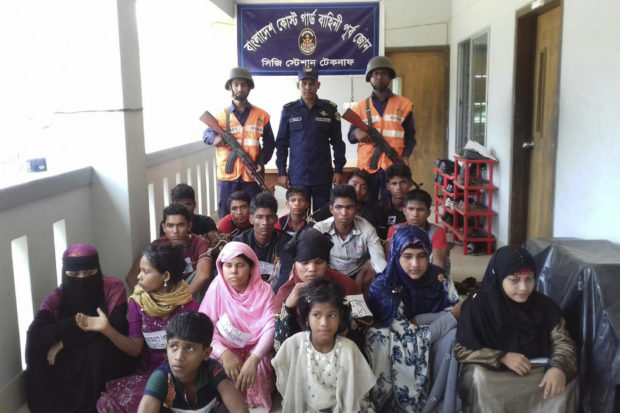Myanmar frees soldiers jailed for Rohingya massacre
YANGON, Myanmar – Seven soldiers jailed for killing a group of Rohingya Muslims have been freed from a Myanmar jail despite serving less time than two reporters imprisoned for exposing the massacre.
Prisons department director general Myint Soe told journalists the soldiers were “no longer in detention”, declining to give any further information.
Four officers and three soldiers were sentenced in 2018 to 10 years with hard labour for killing 10 Rohingya villagers, with army chief Min Aung Hlaing and civilian leader Aung San Suu Kyi holding up the sentence as evidence of accountability within the military.

Bangladesh Coast Guard pose for a photo with rescued Rohingya refugees in Teknaf on May 18, 2019. – Bangladesh authorities prevented 84 Rohingya refugees from Myanmar from attempting a perilous boat journey to Malaysia, officials said on May 18. (Photo by STR / AFP)
Reuters journalists Wa Lone and Kyaw Soe Oo, who helped expose the killing, were jailed last September for seven years on charges linked to their reporting.
They were granted a presidential pardon this month after spending over 500 days behind bars.
The killings unfolded during a bloody army crackdown in 2017 that forced some 740,000 Rohingya to flee across the border into Bangladesh.
Article continues after this advertisementUN investigators say the violence warrants the prosecution of top generals for “genocide” and the International Criminal Court (ICC) has started a preliminary probe.
Article continues after this advertisementPhil Robertson, Human Rights Watch Deputy Asia Director, condemned the soldiers’ release.
He said it reveals the armed forces “don’t consider the Rohingya to be human” and were “never committed to seeing anyone accountable for their crimes”.
Myanmar’s social media, however, lit up with support for the soldiers.
In Myanmar the Rohingya — often referred to as “Bengali” — are widely seen as illegal immigrants from Bangladesh and the Reuters duo garnered little sympathy for their investigation into the killings.
“The two journalists who are traitors to the country were released so why not release the soldiers?” posted Aung Min Thu.
“No country should jail security forces for killing terrorists,” said Maung Thein.
The military has always justified its crackdown in 2017 as a means of rooting out Rohingya insurgents. /gg